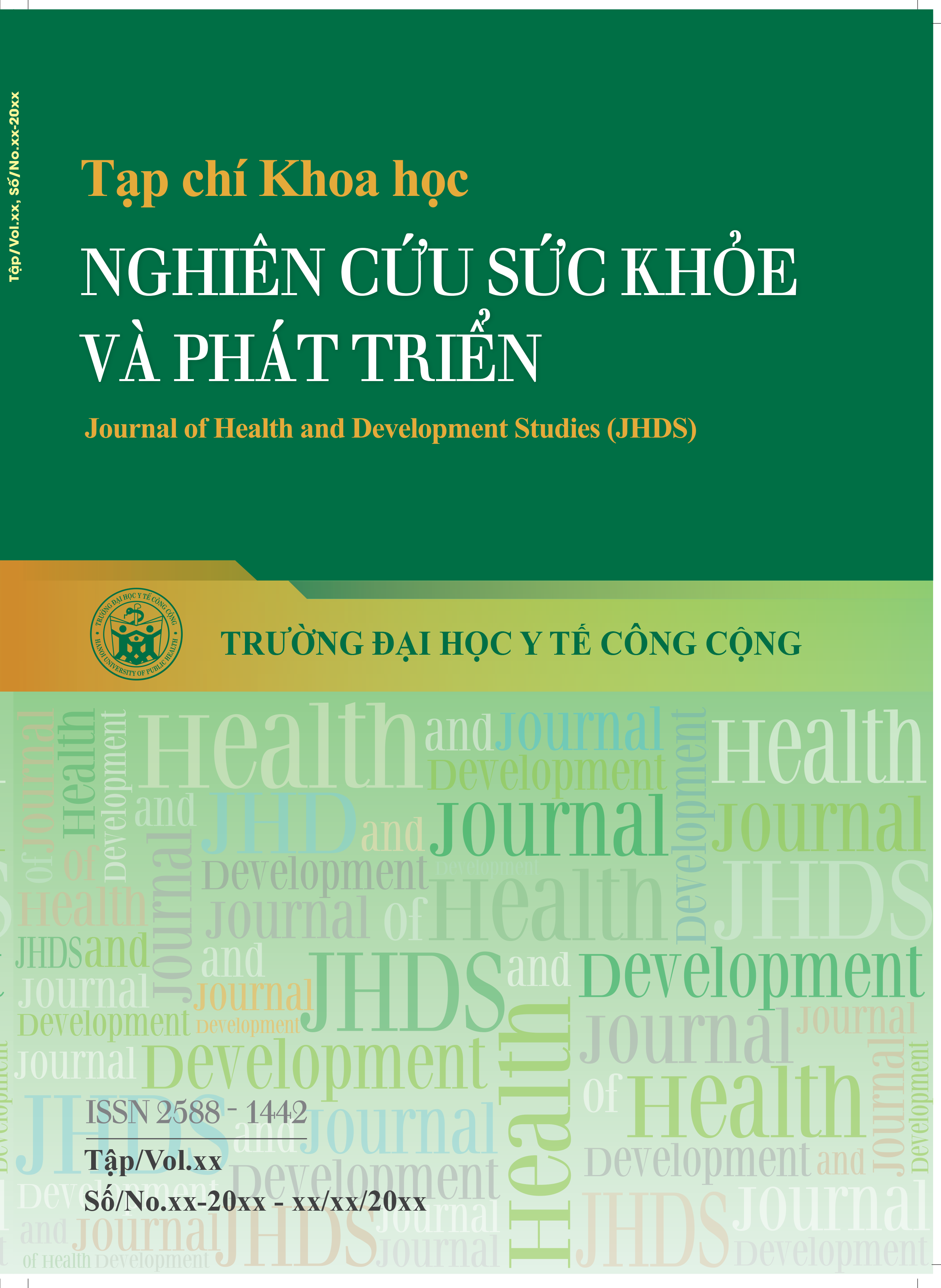Tạp chí
Khoa học Nghiên cứu Sức khỏe và Phát triển
(Journal of Health and Development Studies – JHDS)
Trường Đại học Y tế công cộng
ISSN (Print): 2588-1442
ISSN (Online): XXXX-XXXX
https://jhds.edu.vn
Association between retinol intake and risk of gastric cancer: a case-control study in a Korean population
- Mã bài báo : SKPT_23_050
- Ngày xuất bản : 30/08/2023
- Số trang : 30-40
- Tác giả : Bui Quynh Anh
- Lượt xem : ( 482 )
Danh sách tác giả (*)
- Bui Quynh Anh 1 - Hanoi University of Public Health
- Madhawa Gunathilake 1 - Department of Cancer Biomedical Science, Graduate School of Cancer Science and Policy, National Cancer Center, Goyang-si, Gyeonggi-do, South Korea
- Jeonghee Lee 2 - Department of Cancer Biomedical Science, Graduate School of Cancer Science and Policy, National Cancer Center, Goyang-si, Gyeonggi-do, South Korea
- Il Ju Choi 3 - Center for Gastric Cancer, National Cancer Center Hospital, National Cancer Center, Goyang-si, Gyeonggi-do, South Korea
- Young-Il Kim 4 - Center for Gastric Cancer, National Cancer Center Hospital, National Cancer Center, Goyang-si, Gyeonggi-do, South Korea
- Jeongseon Kim - Department of Cancer Biomedical Science, Graduate School of Cancer Science and Policy, National Cancer Center, Goyang-si, Gyeonggi-do, South Korea
Objectives: Gastric cancer has the fifth highest incidence among cancers in the world and is the most common cancer in South Korea. Several studies suggested a protective role of retinol in oesophageal, liver, lung, and breast cancer, while this effect was still inconsistent in gastric cancer.
Methods: We conducted a case-control study that included 415 cases and 830 controls at the National Cancer Center Hospital in Korea. Dietary information of the participants was collected using a validated semi-quantitative food frequency questionnaire (SQFFQ) covering 106 food items. A multivariate logistic regression model was performed to investigate the association between retinol intake and risk of gastric cancer.
Results: The highest consumption of retinol intake was significantly associated with lower odds of gastric cancer in the total subjects (odds ratio (OR)=0.58, 95% confidence interval (CI)=0.37–0.89), and among women (OR = 0.43, 95% CI = 0.21–0.89), but not among men (OR = 0.72, 95% CI = 0.41–1.26). After stratifying by Helicobacter pylori (H. pylori) infection, we identified a reduced risk of gastric cancer when consuming the highest level of retinol intake only among H. pylori-positive patients. This trend was demonstrated in the subgroups of current drinkers and those who had not smoked without adjustment for H. pylori infection.
Conclusion: Retinol intake was proved as a protective factor against gastric cancer, and this effect remained among women and patients with H. pylori infection even after adjustment for multivariable.
- DOI : https://doi.org/10.38148/JHDS.0704SKPT23-050
- Chủ đề : Mô hình sức khỏe, ốm đau, bệnh tật, chất lượng cuộc sống
- Loại bài báo : Nghiên cứu điển hình
- Chuyên nghành : Chuyên Ngành Y
 Thông tin liên hệ : Jeongseon Kim
Thông tin liên hệ : Jeongseon Kim Email : jskim@ncc.re.kr
Email : jskim@ncc.re.kr Địa chỉ : Department of Cancer Biomedical Science, Graduate School of Cancer Science and Policy, National Cancer Center, Goyang-si, Gyeonggi-do, South Korea
Địa chỉ : Department of Cancer Biomedical Science, Graduate School of Cancer Science and Policy, National Cancer Center, Goyang-si, Gyeonggi-do, South Korea
Bài báo liên quan
- The care needs of dementia patients in Nam Dong District, Thua Thien Hue Province: An observational study using the Camberwell Assessment of Need for the Elderly questionnaire
- Preventive Measures Against Monkeypox: A Scoping Review
- How KoboToolbox versus Unipark platform are selected in data survey to detect child maltreatment in Vietnam: A discussion paper
- Respiratory function of workers at some wood factories in Bac Tu Liem district, 2022
- Mental health of people with and without disabilities in Vietnam during the COVID-19 pandemic
- Cause-specific mortality in A6 death registration system: results from a population-based study in Hanoi 2017, Vietnam
- Stress situation and associated factors among nursre in clinical departments at Sa Dec General Hospital, Dong Thap province, in 2021
- Short-term effects of air pollution on respiratory hospitalizations in Ha Nam, during 2018-2020
- Quality of life of type 2 diabetes outpatients and the associated factors: A cross-sectional study at Ha Dong General Hospital in 2020
- Perception of patient safety and associated factors among health staff: A cross-sectional study in some hospitals in Vietnam
- Applying tools to support human resource management in HIV/AIDS prevention and control in 7 provinces: Initial results on the appropriateness and scalability
- Stress of the mothers in caring for children with developmental disabilities and some related factors
- Stress among nurses and associated factors during the COVID-19 pandemic in Hanoi, Vietnam, in 2022
- Drinking water quality and associated factors at water supply stations in Quang Ngai Province in 2022
- Association between retinol intake and risk of gastric cancer: a case-control study in a Korean population
- Compliance with National guidelines for antibiotic prophylaxis use in surgery: A case study in Thu Duc City Hospital, South of Vietnam
- Economic, Social, and Mental Health Difficulties Among High School Students in Hanoi During the COVID-19 Lockdown Period
Bài viết mới nhất
- Một số trang web hữu ích đối với các nhà khoa học
- Dành cho chuyên gia
- Tạp chí Khoa học Nghiên cứu sức khỏe và Phát triển duyệt tối đa 1,0 điểm ngành Y trong Danh mục Tạp chí khoa học được tính điểm của Hội đồng giáo sư Nhà nước
- CHÚC MỪNG NGÀY BÁO CHÍ CÁCH MẠNG VIỆT NAM (21/6)
- GS.TS Hoàng Văn Minh - Hiệu trưởng Nhà trường 'lọt top' nhà khoa học có chỉ số trích dẫn hàng đầu thế giới

 File toàn văn
File toàn văn